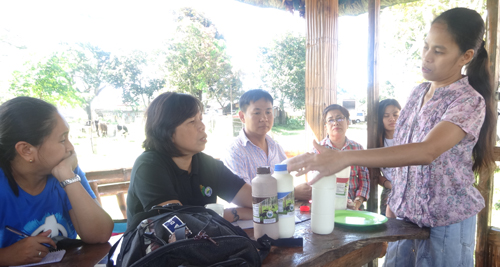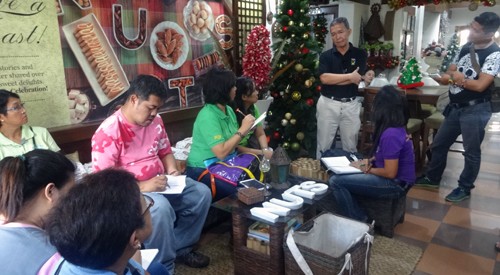 J. Emmanuel Pastries Marketing and Special Events Head Jun Olin entertains queries from the I-PLAN team about the company’s best practices in business operation.
J. Emmanuel Pastries Marketing and Special Events Head Jun Olin entertains queries from the I-PLAN team about the company’s best practices in business operation. Potential of Bicol commodities, key players’ best practices explored at I-PLAN Educational Visit and Learning Exchange
November 26, 2015
Discovering wide opportunities and strategies to boost Bicol’s priority commodities. That makes the I-PLAN Educational Visit and Learning Exchange worth doing.
According to Anita Borero of the Provincial Project Management and Implementation Unit (PPMIU) Camarines Norte, who joined the expository tour, she was amazed to find out that farmers have countless opportunities to increase their income given enough assistance in linkaging and marketing their products.
For Eve M. Espinas of PPMIU-Albay, the activity provided her a bird’s eye view of Albay’s commodities, their development potentials and constraints as well as market outlets.
To capacitate the PPMIUs in finalizing their value chain analysis (VCA) and Provincial Commodity Investment Plans (PCIPs), the I-PLAN team, headed by Planning Specialist Mary Ann R. Cuya conducted a four-day Educational Visit and Learning Exchange in some parts of Camarines Sur, Camarines Norte, Quezon, Laguna, and Batangas on November 17-20, 2015. The activity also aimed to provide the RPCO and PPMIU I-PLAN teams with technical knowledge and skills to expedite the completion of their VCAs and PCIPs as part of the Philippine Rural Development Project’s (PRDP) capacitating support mechanism.
At Rosalina S. Tan’s “Save Our Soil Foundation” office in Pili, Camarines Sur, the I-PLAN team discovered the potential of pili elemi being manufactured at Nature Wonders Enterprises, supplier of pili nuts and natural skin care products owned by Tan based in San Juan City, Metro Manila. From pili elemi bought at P100 per kilo, Tan produces natural organic skin care products including pili bath soap, pili lip balm and lip stick, and pili body oil sold at P336 to P1,150 each.
Meanwhile, at J. Emmanuel Pastries in Canaman, Camarines Sur, Marketing and Special Events Head, Jun Olin emphasized the benefits of private-government partnership and of following the standard quality of raw materials. Established in 1997, J. Emmanuel Pastries currently exports pili nut products to Great Britain, Canada, U.S., Japan, South Korea, China, and other Asian countries. It also has local markets in Laguna, Cebu, as well as Metro Manila and has five pasalaubong centers in Naga City. The company buys fresh pili nuts for P20 to P30 per kilogram and processes them into export-quality crispy pili nuts sold at P50 to P500.
“At J. Emmanuel Pastries, we say no to shortcuts and instant gratification. We go for quality and follow standards,” Olin said.
In Daet, Camarines Norte, the I-PLAN team conducted a focus group discussion (FGD) with Dr. Arsenio B. Ella, Scientist III of the Department of Science and Technology (DOST) Forest Products Research and Development Institute (FPRDI), who shared his knowledge on traditional and industrial uses of pili elemi, its chemical composition, proper tapping procedure, and production and export potentials.
According to Ella, based on the 2011 Philippine Forestry Statistics, 372,000 kilograms of pili elemi is valued at 977,000 dollars. He added that the annual costs and returns of tapping 36 pili trees show an increase in income amounting to P38,070 per year. Moreover, he said that tapping pili resin using the proper or scientific techniques prolongs the life of the pili tree, boosts its resin production, provides additional income of tappers and the government and helps in the government’s conservation and climate change adaptation programs.
The I-PLAN team also listened to Labo Multi-Purpose Cooperative (LMPC) General Manager Mario M. Espeso’s brief orientation on the organization’s profile and operation. The cooperative, based in Brgy. Malasugui, Labo, Camarines Norte, now has a total asset of P73,017,221.03 and 8,855 members engaged in fruit processing, pineapple cloth, and fiber production. LMPC was identified as the proponent group of PPMIU-Camarines Norte’s P22,345,000-worth Camarines Norte Pineapple Trading and Processing Project business enterprise under PRDP I-REAP.
In Gumaca, Quezon, the I-PLAN team had a FGD with Edgardo Abel C. Satrain, one of the country’s biggest pili elemi producers, who shared his expertise in pili elemi business operation, quality control and storage. Satrain exports pili elemi to U.S., Japan and Europe where it is used for paint, perfume, and pharmaceuticals production.
At Greenlife Coconut Products Philippines Inc. in Tayabas, Quezon, Chief Executive Officer and owner Francisco P. Rubio provided inputs on the company’s coconut products and operation of its standardization plant. Established in 2009, Greenlife Coconut Products Philippines Inc. is engaged in manufacturing and standardization of virgin coconut oil (VCO) and other coconut products including coco vinegar, massage and body oil, and coconut sugar. The company is registered with the Philippine Coconut Authority and Food and Drug Administration and is a PhilExport Member and Certified Organic by Control Union Inspections Pvt Lt.
Rubio shared the advantages of being certified organic. “Pag certified organic ka, may buyer ka, may record, may standard value and that gives you bargaining power (If your product is certified organic, you get a buyer, you get a record, there is standard value and that gives you bargaining power),” he said. He mentioned that prospective markets in the U.S., Europe and Japan are looking for organic-certified products.
The I-PLAN team also had a FGD with Mrs. Nancy Young, owner of Global Food Solutions Inc., a company based in San Pablo City, Laguna that offers service and airline catering products including tropical fruit preserves for desert products, frozen fruits and vegetables, and fishery products. Young underscored the importance of quality assurance to ensure business success. Global Food Solutions Inc. holds a Food Safety System certification, Hazard Analysis and Critical Points (HACCP) and Good Manufacturing Practices (GMP) certification by SGS and Bureau of Fisheries and Aquatic Resources (BFAR). The company is also accredited by the Islamic Da’wah Council of the Philippines as HALAL certified.
The I-PLAN team also visited the Batangas Dairy and Multi-Purpose Cooperative (BADACO) in Lipa, Batangas and the Livestock Auction Market in Padre Garcia, Batangas to explore opportunities for the region’s livestock commodities.
The I-PLAN team will conduct a similar educational visit and learning exchange in Region VII on December 1-5, 2015 to familiarize themselves with the commodity flow of the value chain for seaweeds, coconut shell charcoal and mango.
PRDP is a six-year project being implemented by the Department of Agriculture that aims to establish a modern, inclusive, value-chain oriented and climate-smart agriculture and fisheries sector. (Annielyn L. Baleza, I-SUPPORT InfoACE Unit, DA-RAFIS 5)
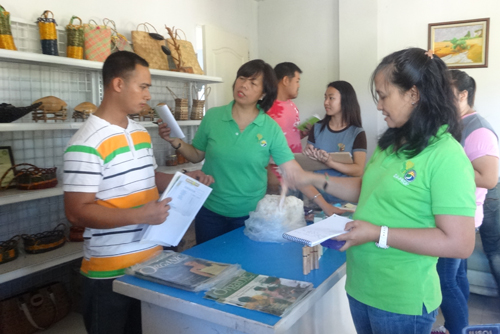
Alex Bongon (left) of Rosalina S. Tan’s Save Our Soil Foundation orients the I-PLAN team about the products sourced from pili elemi.
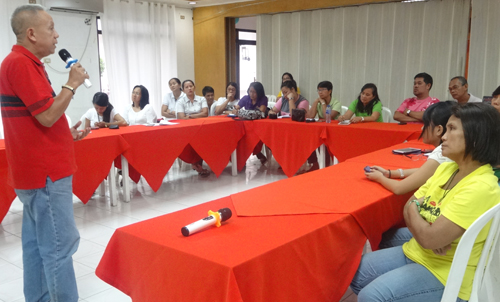
Dr. Arsenio B. Ella, Scientist III of the Department of Science and Technology (DOST) Forest Products Research and Development Institute (FPRDI), shares his knowledge on traditional and industrial uses of pili elemi, its chemical composition, proper tapping procedure, and production and export potentials during a focus group discussion with the I-PLAN team.
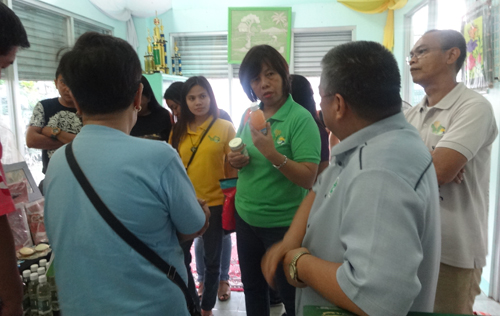
The I-PLAN team visits the office and showroom of the Labo Multi-Purpose Cooperative (LMPC). General Manager Mario M. Espeso provides a brief orientation on the organization’s profile, products and operation.
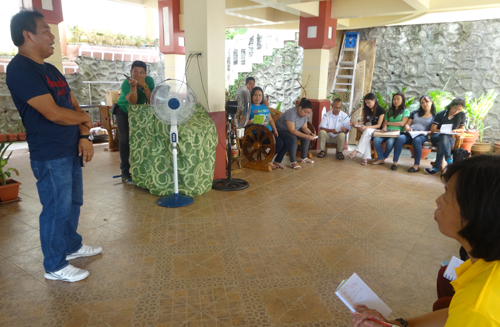
Pili elemi producer Edgardo Abel C. Satrain shares his expertise in pili elemi business operation during a focus group discussion with the I-PLAN team in his residence in Gumaca, Quezon.
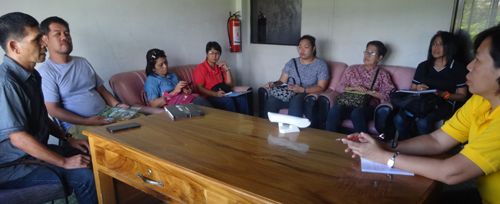
Greenlife Coconut Products Philippines Inc. Chief Executive Officer and owner Francisco P. Rubio provides inputs on the operation of the company’s standardization plant.

